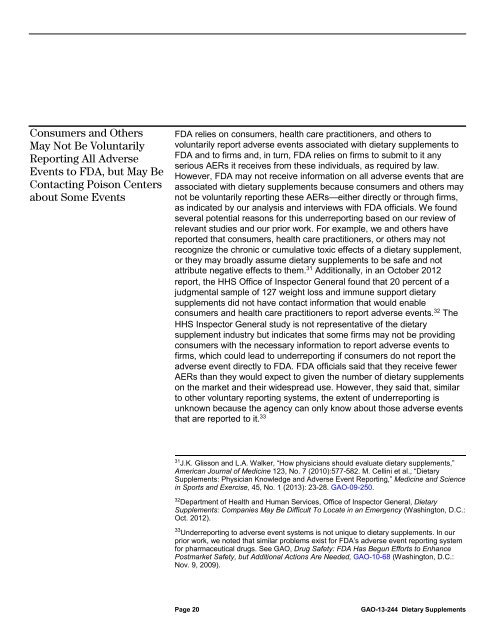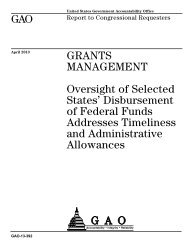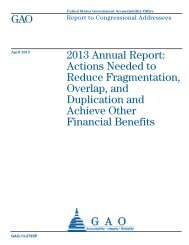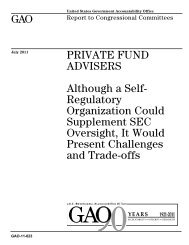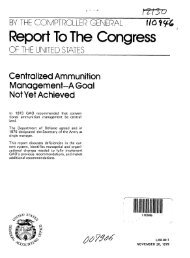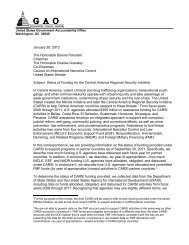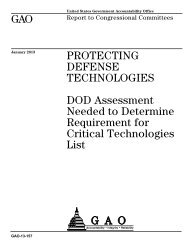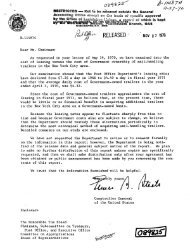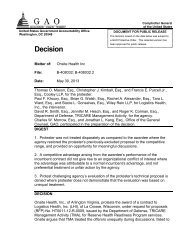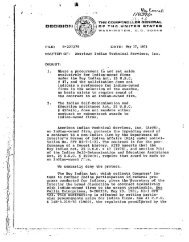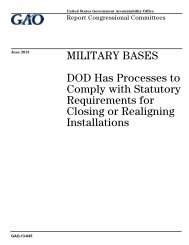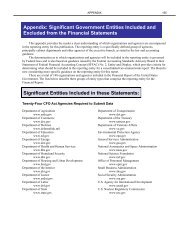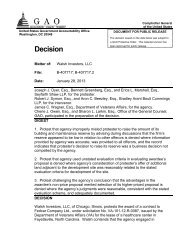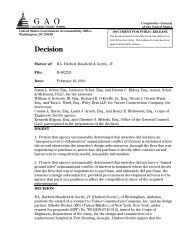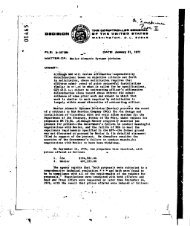Dietary supplements: FDA may have opportunities to expand its use
Dietary supplements: FDA may have opportunities to expand its use
Dietary supplements: FDA may have opportunities to expand its use
Create successful ePaper yourself
Turn your PDF publications into a flip-book with our unique Google optimized e-Paper software.
Consumers and Others<br />
May Not Be Voluntarily<br />
Reporting All Adverse<br />
Events <strong>to</strong> <strong>FDA</strong>, but May Be<br />
Contacting Poison Centers<br />
about Some Events<br />
<strong>FDA</strong> relies on consumers, health care practitioners, and others <strong>to</strong><br />
voluntarily report adverse events associated with dietary <strong>supplements</strong> <strong>to</strong><br />
<strong>FDA</strong> and <strong>to</strong> firms and, in turn, <strong>FDA</strong> relies on firms <strong>to</strong> submit <strong>to</strong> it any<br />
serious AERs it receives from these individuals, as required by law.<br />
However, <strong>FDA</strong> <strong>may</strong> not receive information on all adverse events that are<br />
associated with dietary <strong>supplements</strong> beca<strong>use</strong> consumers and others <strong>may</strong><br />
not be voluntarily reporting these AERs—either directly or through firms,<br />
as indicated by our analysis and interviews with <strong>FDA</strong> officials. We found<br />
several potential reasons for this underreporting based on our review of<br />
relevant studies and our prior work. For example, we and others <strong>have</strong><br />
reported that consumers, health care practitioners, or others <strong>may</strong> not<br />
recognize the chronic or cumulative <strong>to</strong>xic effects of a dietary supplement,<br />
or they <strong>may</strong> broadly assume dietary <strong>supplements</strong> <strong>to</strong> be safe and not<br />
attribute negative effects <strong>to</strong> them. 31 Additionally, in an Oc<strong>to</strong>ber 2012<br />
report, the HHS Office of Inspec<strong>to</strong>r General found that 20 percent of a<br />
judgmental sample of 127 weight loss and immune support dietary<br />
<strong>supplements</strong> did not <strong>have</strong> contact information that would enable<br />
consumers and health care practitioners <strong>to</strong> report adverse events. 32 The<br />
HHS Inspec<strong>to</strong>r General study is not representative of the dietary<br />
supplement industry but indicates that some firms <strong>may</strong> not be providing<br />
consumers with the necessary information <strong>to</strong> report adverse events <strong>to</strong><br />
firms, which could lead <strong>to</strong> underreporting if consumers do not report the<br />
adverse event directly <strong>to</strong> <strong>FDA</strong>. <strong>FDA</strong> officials said that they receive fewer<br />
AERs than they would expect <strong>to</strong> given the number of dietary <strong>supplements</strong><br />
on the market and their widespread <strong>use</strong>. However, they said that, similar<br />
<strong>to</strong> other voluntary reporting systems, the extent of underreporting is<br />
unknown beca<strong>use</strong> the agency can only know about those adverse events<br />
that are reported <strong>to</strong> it. 33<br />
31 J.K. Glisson and L.A. Walker, “How physicians should evaluate dietary <strong>supplements</strong>,”<br />
American Journal of Medicine 123, No. 7 (2010):577-582. M. Cellini et al., “<strong>Dietary</strong><br />
Supplements: Physician Knowledge and Adverse Event Reporting,” Medicine and Science<br />
in Sports and Exercise, 45, No. 1 (2013): 23-28. GAO-09-250.<br />
32 Department of Health and Human Services, Office of Inspec<strong>to</strong>r General, <strong>Dietary</strong><br />
Supplements: Companies May Be Difficult To Locate in an Emergency (Washing<strong>to</strong>n, D.C.:<br />
Oct. 2012).<br />
33 Underreporting <strong>to</strong> adverse event systems is not unique <strong>to</strong> dietary <strong>supplements</strong>. In our<br />
prior work, we noted that similar problems exist for <strong>FDA</strong>’s adverse event reporting system<br />
for pharmaceutical drugs. See GAO, Drug Safety: <strong>FDA</strong> Has Begun Efforts <strong>to</strong> Enhance<br />
Postmarket Safety, but Additional Actions Are Needed, GAO-10-68 (Washing<strong>to</strong>n, D.C.:<br />
Nov. 9, 2009).<br />
Page 20<br />
GAO-13-244 <strong>Dietary</strong> Supplements


